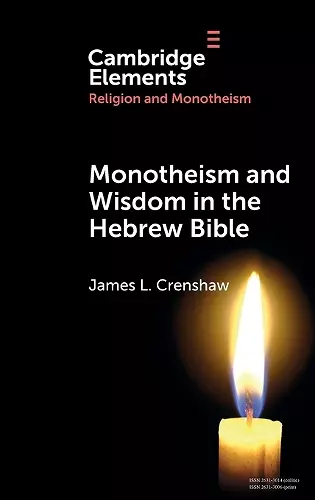Monotheism and Wisdom in the Hebrew Bible
An Uneasy Pair?
Format:Hardback
Publisher:Cambridge University Press
Published:13th Feb '25
£49.99
Supplier delay - available to order, but may take longer than usual.
This hardback is available in another edition too:
- Paperback£17.00(9781009491891)

This Element explores the link between monotheism and wisdom, highlighting compromises like dualism, act-consequence, and flawed creation.
This Element explores how monotheism and wisdom in ancient Egypt, Mesopotamia, and Israel faced resistance. Early biblical wisdom depicted a human-like deity and transcendent. Satan and Wisdom communicated God's will, combining biblical revelation and Hellenism. Over time, the concept of God evolved, continuing a Paleolithic process.Monotheism, belief in only one God, and wisdom, learning to cope by reason alone and teaching others to do so, faced resistance in the polytheistic world of ancient Egypt, Mesopotamia, and lesser states including Israel. Paradoxically, in early biblical wisdom (Proverbs, Job, and Ecclesiastes) the deity was thought to be both human-like, with disturbing attributes, and increasingly transcendent-silent, disembodied, and inactive. Like Egyptian Ma'at, God the creator established the universe by decree, a law rewarding goodness and punishing evil, the flaw in creation, never satisfactorily resolved. Satan, a semi-divine rival, bore responsibility for bad things, while Wisdom, a personified female, communicated God's will to the discerning. Combining biblical revelation and Hellenism, Sirach and Wisdom of Solomon chose piety over Job's realism and the vanity literature of Ecclesiastes. Over millennia, the concept of God evolved, continuing a process begun in Paleolithic times.
ISBN: 9781009491877
Dimensions: unknown
Weight: 268g
70 pages